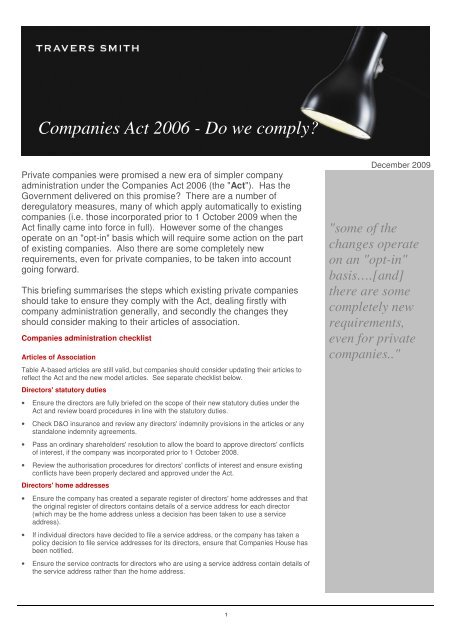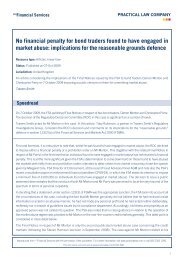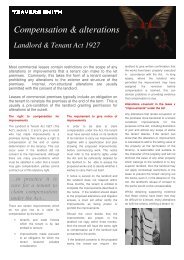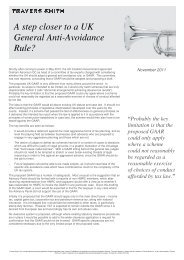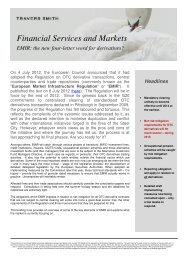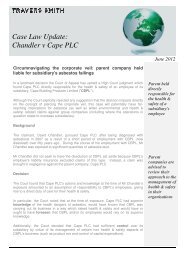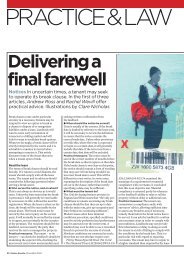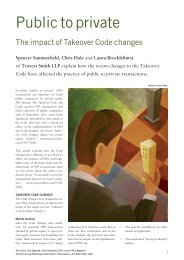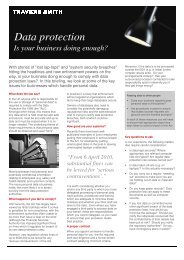Companies Act 2006 - Do we comply? - Travers Smith
Companies Act 2006 - Do we comply? - Travers Smith
Companies Act 2006 - Do we comply? - Travers Smith
You also want an ePaper? Increase the reach of your titles
YUMPU automatically turns print PDFs into web optimized ePapers that Google loves.
<strong>Companies</strong> <strong>Act</strong> <strong>2006</strong> - <strong>Do</strong> <strong>we</strong> <strong>comply</strong>?<br />
Private companies <strong>we</strong>re promised a new era of simpler company<br />
administration under the <strong>Companies</strong> <strong>Act</strong> <strong>2006</strong> (the "<strong>Act</strong>"). Has the<br />
Government delivered on this promise? There are a number of<br />
deregulatory measures, many of which apply automatically to existing<br />
companies (i.e. those incorporated prior to 1 October 2009 when the<br />
<strong>Act</strong> finally came into force in full). Ho<strong>we</strong>ver some of the changes<br />
operate on an "opt-in" basis which will require some action on the part<br />
of existing companies. Also there are some completely new<br />
requirements, even for private companies, to be taken into account<br />
going forward.<br />
This briefing summarises the steps which existing private companies<br />
should take to ensure they <strong>comply</strong> with the <strong>Act</strong>, dealing firstly with<br />
company administration generally, and secondly the changes they<br />
should consider making to their articles of association.<br />
<strong>Companies</strong> administration checklist<br />
Articles of Association<br />
Table A-based articles are still valid, but companies should consider updating their articles to<br />
reflect the <strong>Act</strong> and the new model articles. See separate checklist below.<br />
Directors' statutory duties<br />
• Ensure the directors are fully briefed on the scope of their new statutory duties under the<br />
<strong>Act</strong> and review board procedures in line with the statutory duties.<br />
• Check D&O insurance and review any directors' indemnity provisions in the articles or any<br />
standalone indemnity agreements.<br />
• Pass an ordinary shareholders' resolution to allow the board to approve directors' conflicts<br />
of interest, if the company was incorporated prior to 1 October 2008.<br />
• Review the authorisation procedures for directors' conflicts of interest and ensure existing<br />
conflicts have been properly declared and approved under the <strong>Act</strong>.<br />
Directors' home addresses<br />
• Ensure the company has created a separate register of directors' home addresses and that<br />
the original register of directors contains details of a service address for each director<br />
(which may be the home address unless a decision has been taken to use a service<br />
address).<br />
• If individual directors have decided to file a service address, or the company has taken a<br />
policy decision to file service addresses for its directors, ensure that <strong>Companies</strong> House has<br />
been notified.<br />
• Ensure the service contracts for directors who are using a service address contain details of<br />
the service address rather than the home address.<br />
December 2009<br />
"some of the<br />
changes operate<br />
on an "opt-in"<br />
basis….[and]<br />
there are some<br />
completely new<br />
requirements,<br />
even for private<br />
companies.."<br />
1
Directors - other issues<br />
• Ensure all companies in the group have at least one director who is a natural person.<br />
• Ensure the shareholders have approved any directors' service contract with a term<br />
exceeding two years.<br />
Company secretarial issues<br />
• As private companies no longer have to have a company secretary, if there is no company<br />
secretary, ensure someone has assumed responsibility for statutory filings and maintaining<br />
company records.<br />
• Ensure the company secretary or other relevant personnel are aware of the new<br />
<strong>Companies</strong> House forms and filing requirements.<br />
• Review the company's signing procedures and decide whether to permit a single director to<br />
execute deeds (with a witness).<br />
• Ensure the company's statutory details appear on company stationery, company emails<br />
and <strong>we</strong>bsites.<br />
• Review all register and record requirements under the <strong>Act</strong> as minor changes have been<br />
introduced.<br />
Financial reporting<br />
• Ensure compliance with the new filing deadline for annual reports and accounts (9 months<br />
after the year end for financial years commencing on or after 6 April 2008).<br />
• Review the arrangements for the appointment/re-appointment of auditors and fixing<br />
auditors' remuneration in the light of the new requirements under the <strong>Act</strong>.<br />
Shareholder resolutions<br />
• In general, ensure the company's procedures on shareholder meetings and resolutions<br />
follow the <strong>Act</strong>, in particular the new regime for written resolutions.<br />
• Review existing authorities for share allotments and update in accordance with the <strong>Act</strong>.<br />
• For companies with one class of shares, consider passing an ordinary resolution of<br />
shareholders to enable directors freely to allot shares or conversely placing a restriction in<br />
the articles on the directors' ability to allot shares (see separate checklist below).<br />
• Ensure the relevant personnel are aware of the circumstances in which the company must<br />
file a statement of capital at <strong>Companies</strong> House, including on any allotment or alteration of<br />
share capital and with the annual return.<br />
"Table A-based<br />
articles are still<br />
valid….and the<br />
<strong>Act</strong> does not force<br />
private companies<br />
to update their<br />
articles, but many<br />
companies are<br />
doing so…."<br />
Updating the company's articles<br />
Table A<br />
• Table A-based articles are still valid despite the introduction of new model articles under the<br />
<strong>Act</strong>, and the <strong>Act</strong> does not force private companies to update their articles, but many<br />
companies are doing so to bring their articles into line with the <strong>Act</strong> and the model articles<br />
and to take advantage of some of the new freedoms given to private companies in the <strong>Act</strong>.<br />
Share capital<br />
• The concept of authorised share capital is abolished under the <strong>Act</strong> and a company's<br />
existing authorised share capital will operate as a restriction on the amount of share capital<br />
that may be allotted, so companies should consider removing the authorised share capital<br />
provision (if any) assuming no restriction on allotments is needed.<br />
• Directors of companies with a single class of shares are entitled under the <strong>Act</strong> to allot<br />
shares without shareholder approval provided the shareholders have passed a one-off<br />
ordinary resolution allowing the directors to do so. Conversely, companies with a single<br />
class of shares may prefer to place a limit on the directors' ability to allot shares by inserting<br />
a provision in the articles requiring shareholder approval for allotments.<br />
• Consider removing from the articles any specific authorities for share buy-backs, reductions<br />
of capital, the consolidation and sub-division of shares and the issue of redeemable shares,<br />
as these are no longer relevant under the <strong>Act</strong>.<br />
Memorandum provisions<br />
• The memorandum of association under the <strong>Act</strong> is a much simplified document and no<br />
2
longer contains an objects clause which restricts the scope of the company's activities. For<br />
an existing company, the objects clause in its memorandum will automatically have been<br />
imported into the articles. If the company is to have unrestricted objects going forward, the<br />
imported objects clause should be removed, along with other provisions imported from the<br />
memorandum (e.g. the company name and share capital clauses).<br />
Shareholder meetings and resolutions<br />
• The terms "extraordinary general meeting" and "extraordinary resolution" are not used in<br />
the <strong>Act</strong> and should be replaced with "general meeting" and "special resolution" respectively.<br />
• Update or delete written resolution provisions to reflect the new written resolution procedure<br />
under the <strong>Act</strong>.<br />
• Consider whether the company should continue to hold AGMs (private companies are no<br />
longer obliged to do so) and if not, delete the relevant provisions from the articles.<br />
• Delete the provisions allowing the chairman a casting vote at general meetings.<br />
• Update the proxy/corporate representative provisions in line with the <strong>Act</strong> and the<br />
Shareholders' Rights Regulations which came into force in August 2009.<br />
Electronic communications<br />
• Update the electronic communications provisions (if any) to reflect changes made in the<br />
<strong>Act</strong>, or consider including electronic communications provisions if none <strong>we</strong>re included<br />
previously, since the regime is now easier to implement.<br />
Directors<br />
• Consider including an express sanction for certain conflicts of interest of directors and/or<br />
parameters for the board in considering whether to approve directors' conflicts.<br />
• Consider a parent company approval regime for conflicts affecting directors of whollyowned<br />
subsidiaries.<br />
• Update the provisions relating to directors' declarations of interest or delete them and rely<br />
on the relevant provisions in the <strong>Act</strong> itself.<br />
• Update the provisions on directors' indemnities in line with the <strong>Act</strong>.<br />
• Remove any maximum age limit for directors.<br />
Company secretary<br />
• Most larger private companies have retained their company secretary despite no longer<br />
being obliged to do so under the <strong>Act</strong>. If there is no secretary, remove the relevant<br />
references from the articles.<br />
Company name<br />
• Consider taking advantage of the deregulation of company name changes by specifying<br />
that the company name can be changed by an ordinary resolution (rather than a special<br />
resolution) or, for a wholly-owned subsidiary, a written direction from the parent company.<br />
Company seal<br />
• If the company has a specific authority in its articles for the use of the company seal<br />
overseas, the authority is no longer needed and can be removed.<br />
Definitions/<strong>Companies</strong> <strong>Act</strong> 1985 references<br />
• Replace references to the <strong>Companies</strong> <strong>Act</strong> 1985 and related definitions.<br />
If you would like more information on any of the topics discussed in this briefing, please speak<br />
to your usual contact at the firm.<br />
"Consider… an<br />
express sanction<br />
for certain<br />
conflicts of<br />
interest of<br />
directors…."<br />
<strong>Travers</strong> <strong>Smith</strong><br />
December 2009<br />
10 Snow Hill<br />
London EC1A 2AL<br />
Tel +44 (0)20 7295 3000<br />
Fax +44 (0) 20 7295 3500<br />
www.traverssmith.com<br />
<strong>Travers</strong> <strong>Smith</strong> LLP is a limited liability partnership registered in England and Wales under number OC 336962 and is regulated by the Solicitors Regulation Authority. The word "partner" is used to refer to a member of <strong>Travers</strong> <strong>Smith</strong> LLP. A list of the members of <strong>Travers</strong> <strong>Smith</strong> LLP is open to inspection at<br />
our registered office and principal place of business: 10 Snow Hill, London, EC1A 2AL. We are not authorised under the Financial Services and Markets <strong>Act</strong> 2000 but <strong>we</strong> are able, in certain circumstances, to offer a limited range of investment services because <strong>we</strong> are members of the Law Society of<br />
England and Wales and regulated by the Solicitors Regulation Authority. We can provide these investment services if they are an incidental part of the professional services <strong>we</strong> have been engaged to provide. The information in this document is intended to be of a general nature and is not a substitute for<br />
detailed legal advice.


